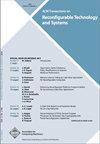FPT 2021特刊简介
IF 2.8
4区 计算机科学
Q2 COMPUTER SCIENCE, HARDWARE & ARCHITECTURE
引用次数: 0
摘要
现场可编程技术国际会议(FPT)被广泛认为是亚太地区最重要的可重构技术系列会议。2021年,计划在奥克兰举行20场系列活动。然而,2019冠状病毒病大流行使传统的现场会议变得不可能,并强制采用纯虚拟的演示和讨论模式。尽管存在这些困难,但FPT的主题仍然像以往一样具有时效性。现场可编程设备(如fpga)具有专用硬件的优点,例如在性能或功率效率方面,但几乎具有类似软件的灵活性和易用性。这使得它们成为一个非常有趣的实现替代方案,适用于cpu或gpu等现成计算平台的性能或灵活性不满足的领域,但不可能使用完全特定于应用的芯片(asic),例如,由于它们非常高的非重复性成本和针对当前硅制造技术所需的极端设计努力。可重构技术包含了广泛的研究课题,必须解决以推进该领域。这些包括工具和设计技术,现场可编程系统的架构,以及现场可编程芯片的设备技术。最后,但并非最不重要的是,研究如何在实践中利用该技术来改进应用程序,将潜在的技术优势转化为最终用户的实际收益。凭借如此广泛的主题,尽管采用虚拟会议模式,FPT 2021在其四个曲目中吸引了129份提交。经过全面的审查过程,包括一个反驳阶段和至少三次研究论文的审查,27篇论文可以被接受为全文(21%的接受率),14篇论文被接受为短文(32%的总体接受率)。会议结束后,我们邀请了FPT会议上最好的八篇论文向ACM TRETS提交了他们工作的扩展版本。四个作者小组接受了这一邀请,并提供了经过全面审查和修订过程的新手稿。在提供的新手稿中,有三份经过充分修订,及时获得接受,可列入本期特刊:本文章由计算机程序翻译,如有差异,请以英文原文为准。
Introduction to the Special Issue on FPT 2021
The International Conference on Field-Programmable Technology (FPT) is widely considered to be the premier conference series on reconfigurable technology in the Asia-Pacific region. In 2021, the 20 event in a series was planned to be held on-location in Auckland. However, the Covid-19 pandemic made a traditional in-presence conference impossible, and imposed a purely virtual mode of presentation and discussion. Despite these difficulties, the topics of FPT remain as current as ever. Field programmable devices such as FPGAs offer the advantages of dedicated hardware, e.g., in terms of performance or power efficiency, but with an almost software-like flexibility and ease-of-use. This makes them a highly interesting implementation alternative for domains where the performance or flexibility of off-theshelf computing platforms such as CPUs or GPUs do not suffice, but the use of fully applicationspecific chips (ASICs) is not possible, e.g., due to their very high non-recurring costs and the extreme design effort required to target current silicon fabrication technologies. Reconfigurable technology encompasses a wide range of research topics that must be addressed to advance the field. These include tools and design techniques, architectures for fieldprogrammable systems, and device technology for field-programmable chips. And, last, but not least, a study of how the technology can be leveraged in practice to improve applications, turning the potential technology benefits into actual gains for the end users. With this wide range of topics, and despite the virtual conference mode, FPT 2021 attracted 129 submissions across its four tracks. After a thorough reviewing process, which included a rebuttal phase and at least three reviews for the research papers, 27 contributions could be accepted as full papers (21% acceptance rate), and 14 as short papers (32% overall acceptance rate). After the conference, we invited the best eight papers from the FPT conference to submit extended versions of their work to ACM TRETS. Four author groups accepted this invitation and provided new manuscripts that underwent the full TRETS review-and-revision process. Of the new manuscripts provided, three were revised sufficiently to achieve acceptance in time for inclusion into this special issue:
求助全文
通过发布文献求助,成功后即可免费获取论文全文。
去求助
来源期刊

ACM Transactions on Reconfigurable Technology and Systems
COMPUTER SCIENCE, HARDWARE & ARCHITECTURE-
CiteScore
4.90
自引率
8.70%
发文量
79
审稿时长
>12 weeks
期刊介绍:
TRETS is the top journal focusing on research in, on, and with reconfigurable systems and on their underlying technology. The scope, rationale, and coverage by other journals are often limited to particular aspects of reconfigurable technology or reconfigurable systems. TRETS is a journal that covers reconfigurability in its own right.
Topics that would be appropriate for TRETS would include all levels of reconfigurable system abstractions and all aspects of reconfigurable technology including platforms, programming environments and application successes that support these systems for computing or other applications.
-The board and systems architectures of a reconfigurable platform.
-Programming environments of reconfigurable systems, especially those designed for use with reconfigurable systems that will lead to increased programmer productivity.
-Languages and compilers for reconfigurable systems.
-Logic synthesis and related tools, as they relate to reconfigurable systems.
-Applications on which success can be demonstrated.
The underlying technology from which reconfigurable systems are developed. (Currently this technology is that of FPGAs, but research on the nature and use of follow-on technologies is appropriate for TRETS.)
In considering whether a paper is suitable for TRETS, the foremost question should be whether reconfigurability has been essential to success. Topics such as architecture, programming languages, compilers, and environments, logic synthesis, and high performance applications are all suitable if the context is appropriate. For example, an architecture for an embedded application that happens to use FPGAs is not necessarily suitable for TRETS, but an architecture using FPGAs for which the reconfigurability of the FPGAs is an inherent part of the specifications (perhaps due to a need for re-use on multiple applications) would be appropriate for TRETS.
 求助内容:
求助内容: 应助结果提醒方式:
应助结果提醒方式:


